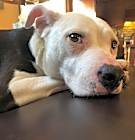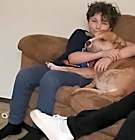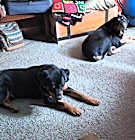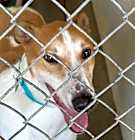No, Welsh Terriers do not shed much, if at all. Their wiry, dense coat tends to trap loose hairs, reducing the amount of shedding compared to many other breeds. Brushing the coat a few times a week will maintain its condition and minimize shedding.
Welsh Terrier
Breed Type: Terrier
Common nicknames: Welsh, Welshie, WT
Coat: Wiry, double
Hypoallergenic: Yes, they may not trigger allergies.
Temperament: Friendly, playful, energetic, independent
Life expectancy: 10-15 years
Color & patterns: Black and tan

Experience the spirited and lovable nature of the Welsh Terrier, a breed that embodies intelligence, charm, and a heart full of adventure. Welsh Terriers typically stand at around 14 to 15 inches tall, showcasing their compact, sturdy, and athletic appearance. Their wiry coats have unique colorations, adding charm to their appearance and requiring regular grooming. Welsh Terriers are known for their friendly and outgoing natures, making them wonderful playmates and loyal family members, and their intelligence and quick wit make them eager learners and excellent participants in various activities.
Welsh Terrier characteristics
Learn about about Welsh Terrier basics like their fur colors, shedding levels, how much grooming they need, and other Welsh Terrier facts.
Average height
15-29 inches (38.1-73.7cm)
Average weight
13-15 pounds (5.9-6.8 kg)
Average lifespan
10-15 years
Exercise needs
Grooming needs
Full-grown size
Good with cats
Good with kids
Training Aptitude
What colors do Welsh Terriers come in?
Welsh Terriers are black and tan. The color pattern for Welsh Terriers includes a black saddle (covering the back, sides, and upper tail) with tan markings on the legs, undercarriage, and head. The tan is typically a deep reddish color, though slightly lighter shades are sometimes seen.
How big do Welsh Terriers get?
Welsh Terriers are medium-sized dogs, with most weighing about 20 pounds and standing around 15 inches tall at the shoulder. Males and females are similar in size, with only slight variations.
Can a Welsh Terrier have erect ears?
No, Welsh Terriers do not have erect ears. According to the breed standard, Welsh Terriers have V-shaped ears that fold forward. The ears are small, set at the level of the skull, and carried forward close to the cheeks.
How many types of Welsh Terriers are there?
There is only one type of Welsh Terrier. The breed is standardized and recognized by major kennel clubs, such as the American Kennel Club (AKC) and the United Kennel Club (UKC).
Is a Welsh Terrier a good family dog?
Yes, Welsh Terriers are good family dogs. They are loyal to their families and can be protective, but they are also friendly and outgoing and enjoy being part of family activities. Welsh Terriers can adapt to various living environments, including apartments, as long as they receive enough exercise and mental stimulation.
Welsh Terriers tend to get along well with children, but as with any breed, it is recommended that your child is always supervised when interacting with your dog to keep both the child and dog safe. Teaching children how to properly approach and handle dogs is crucial to ensure positive experiences for both the dog and the child, as is teaching dogs how to interact gently with children.
Welsh Terrier health
Learn about about the Welsh Terrier health outlook and what diseases they may be prone to at various stages of their life.
Do Welsh Terriers need grooming?
Yes, Welsh Terriers need grooming to keep their coat and skin healthy. Their wiry coat requires specific care to maintain its texture and appearance. Hand-stripping is recommended a few times a year. This process involves plucking out dead hairs by hand or using a stripping knife to maintain the coat’s wiry texture. Professional groomers often perform this task. Brush your Welsh Terrier with a slicker brush a few times a week to remove loose hairs and dirt.
Do Welsh Terriers have a lot of health problems?
Welsh Terriers are a healthy and robust breed, but like all purebred dogs, they can be prone to certain health issues. Some of the common health concerns associated with Welsh Terriers include:
Glaucoma: A condition that causes excessive pressure on the eye and makes fluid drainage difficult, eventually damaging the optic nerve and causing vision loss and blindness.
Hypothyroidism: A thyroid malfunction that results in low hormone production and could cause obesity, low energy, and a brittle coat.
Epilepsy: A seizure disorder.
Allergies: Skin allergies and food sensitivities can occur in Welsh Terriers, leading to itching, scratching, and skin irritation.
Patellar luxation: A condition where the kneecap (patella) temporarily slips out of place, causing lameness or difficulty walking.
Lens luxation: This is a condition where the lens of the eye becomes displaced, which can lead to pain and vision problems.
Cataracts: Cloudy areas in the lens of the eye that can cause vision impairment.
Are Welsh Terriers hypoallergenic?
Yes, Welsh Terriers are considered hypoallergenic to some extent. Welsh Terriers have a wiry, dense coat that sheds minimally. Their coat traps loose hairs, limiting the amount of dander and allergens released into the environment.
However, no dog breed is completely hypoallergenic. People with allergies can still react to the proteins found in a dog’s saliva, urine, and skin cells. If you have allergies, spend time with adult Welsh Terriers before bringing one home to assess your reaction.
Welsh Terrier history
Learn about where this Welsh Terrier came from!
Where are Welsh Terriers from?
Welsh Terriers are from Wales, which is part of the United Kingdom. This breed was developed in the 18th century for hunting foxes, rodents, and badgers. Welsh Terriers are known for their friendly and spirited nature, as well as their distinctive wiry coat. They share some similarities with the Airedale Terrier, but they are smaller in size.
Welsh Terrier temperament
Learn about about the Welsh Terrier temperament and how well they fit into your lifestyle, home environment, and family.
Do Welsh Terriers bark a lot?
No, Welsh Terriers don’t bark a lot compared to some other terrier breeds. Each dog is unique, and some Welsh Terriers might bark more than others based on their personality and environment. Welsh Terriers are watchful dogs and might bark to alert their pet parents to something unusual or visitors approaching the home. Some Welsh Terriers might exhibit territorial barking, especially if they perceive a threat to their territory or family. With appropriate training and enough exercise, you can help manage and reduce excessive barking in this breed.
Is a Welsh Terrier a good family dog?
Yes, Welsh Terriers are good family dogs. They are friendly and enjoy being part of family activities, forming strong bonds with their human family members. Their lively and playful nature meshes well with active families, especially those who enjoy outdoor activities and playtime. While they have energy to burn, Welsh Terriers can adapt to various living situations, including apartments, as long as they receive enough exercise and mental stimulation.
Are Welsh Terriers good with cats?
Yes, many Welsh Terriers are good with cats, especially if they are introduced to each other from a young age. Like many terriers, Welsh Terriers have a natural prey drive, which can lead them to chase small animals, including cats. Early training and positive reinforcement can help curb this behavior. Each dog is unique, and some Welsh Terriers might have a higher prey drive or be less tolerant of cats. Monitor their interactions so you can help manage any potential issues.
Are Welsh Terriers stubborn?
Yes, Welsh Terriers can be stubborn. Welsh Terriers are independent thinkers and might choose to ignore commands if they don’t see the immediate benefit or if they are not motivated by the reward offered. These strong-willed dogs often prefer to make their own decisions rather than always following instructions from their pet parent. With consistent training, positive reinforcement, and a good understanding of their independent nature, Welsh Terriers can overcome their stubborn tendencies and become well-behaved and enjoyable companions.
Do Welsh Terriers dig a lot?
Yes, Welsh Terriers dig a lot, a behavior that is typical for terriers, which were originally bred for hunting and digging out prey, such as rodents and small animals. Digging is a way for Welsh Terriers to release excess energy or alleviate boredom, especially if they are not getting enough physical and mental stimulation. Some Welsh Terriers might dig to investigate interesting scents or to search for buried objects. Digging can also serve as a way for dogs to cool down in warmer weather by exposing cooler soil.
To manage digging behavior in Welsh Terriers, ensure your Welsh Terrier receives enough exercise and mental stimulation through walks, playtime, and interactive toys. A tired dog is less likely to engage in excessive digging. You can also create a designated area in your yard where digging is allowed, such as a sandbox filled with loose soil or sand. Encourage digging in this area and redirect them to it when they start digging elsewhere.
Are Welsh Terriers easy to train?
No, Welsh Terriers are not easy to train in the traditional sense. They are intelligent dogs but can also be independent and strong-willed, which presents some training challenges and might require more effort and patience since they aren’t as eager to please as some other breeds.
It's worth noting that training any dog takes substantial time and effort, regardless of breed, but Welsh Terriers, like many other breeds, benefit from consistent training routines and clear boundaries. They can excel in obedience training and develop into well-behaved companions with positive reinforcement, consistency, and early socialization.
Are Welsh Terriers good with kids?
Yes, Welsh Terriers are good with kids, especially when they are raised together and properly socialized from a young age. Welsh Terriers are generally friendly and playful, making them enjoyable companions for children. They have a good amount of energy and can keep up with active children who enjoy playing games and activities.
Teaching children how to respectfully approach and interact with dogs is crucial for fostering a positive relationship, as is teaching dogs how to gently interact with children. Always supervise interactions between any dog and young children to ensure everyone behaves appropriately and safely.
Popular Welsh Terrier mixes
Welsh Terriers are sometimes mixed with various other breeds, either accidentally or to create unique hybrid dogs. Some Welsh Terrier mixes you might see include:
Hava-Welsh (Welsh Terrier + Havanese)
Welshund (Welsh Terrier + Dachshund)
Woodle (Welsh Terrier + Poodle)
Wowauzer (Welsh Terrier + Schnauzer)
Welsh Cocker (Welsh Terrier + Cocker Spaniel)

Find Welsh Terrier puppies near you
Adopting a Welsh Terrier
We don't see any Welsh Terriers available for adoption in your exact location or cities near you, but here are some adorable similar breeds in Columbus, OH.

Penny
American Pit Bull Terrier Mutt
Female, adult
Westerville, OH
Not good with dogs
Not good with cats
House-trained
Spayed or Neutered
Shots are up-to-date

Lucky
Mutt Labrador Retriever
Male, adult
Westerville, OH
Good with dogs
Not good with cats
House-trained

Barry
Shih Tzu Bichon Frise
Male, 5 yrs 9 mos
Westerville, OH
Not good with dogs
Not good with cats

Herbie 🩷
Shih Poo
Male, young
Westerville, OH
Good with dogs
Good with cats
Needs experienced adopter
House-trained
Shots are up-to-date

Henry and Raaz
Rottweiler
Male, adult
Westerville, OH
Not good with dogs
Not good with cats
Needs experienced adopter
House-trained
Spayed or Neutered

Pudge
Greyhound Hound (Unknown Type)
Female, 3 yrs 7 mos
Westerville, OH
Not good with dogs
Not good with cats
Spayed or Neutered
Shots are up-to-date

Woody
Greyhound Hound (Unknown Type)
Male, adult
Westerville, OH
Good with dogs
Not good with cats
Spayed or Neutered
Shots are up-to-date

Reacher
Greyhound Hound (Unknown Type)
Male, 3 yrs 6 mos
Westerville, OH
Good with dogs
Not good with cats
Spayed or Neutered
Shots are up-to-date

Penny
American Pit Bull Terrier Mutt
Female, adult
Westerville, OH
Not good with dogs
Not good with cats
House-trained
Spayed or Neutered
Shots are up-to-date

Lucky
Mutt Labrador Retriever
Male, adult
Westerville, OH
Good with dogs
Not good with cats
House-trained

Barry
Shih Tzu Bichon Frise
Male, 5 yrs 9 mos
Westerville, OH
Not good with dogs
Not good with cats

Herbie 🩷
Shih Poo
Male, young
Westerville, OH
Good with dogs
Good with cats
Needs experienced adopter
House-trained
Shots are up-to-date

Henry and Raaz
Rottweiler
Male, adult
Westerville, OH
Not good with dogs
Not good with cats
Needs experienced adopter
House-trained
Spayed or Neutered

Pudge
Greyhound Hound (Unknown Type)
Female, 3 yrs 7 mos
Westerville, OH
Not good with dogs
Not good with cats
Spayed or Neutered
Shots are up-to-date




